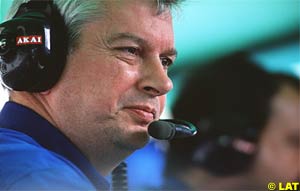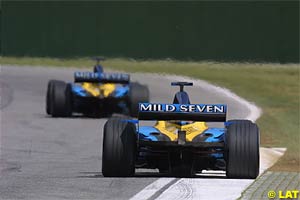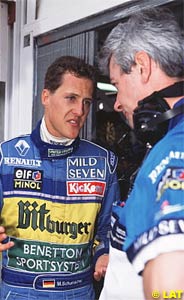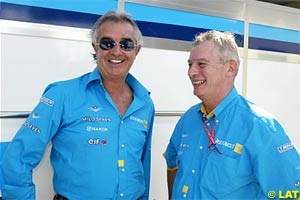
Bringing Back the Glory Days
Atlas F1 Technical Writer
Pat Symonds was one of the key players in the success of the Benetton team when, with Michael Schumacher, they were the dominant force in Formula One in the mid-nineties. Symonds was also there when the team began to disintegrate with the departure of Schumacher as well as Rory Byrne and Ross Brawn. Now at the re-badged Renault squad, Symonds is confident of claiming the ultimate glory again. Atlas F1's Will Gray talked to him about the French team and their quest to return to the top of the sport after a year in the doldrums
Back in 1994 and 1995 they were almost invincible. Michael Schumacher was in the driving seat and the design combination of Ross Brawn and Rory Byrne, currently plying their trade with Schumacher at Ferrari, was at the helm. Championships, of course, came their way.
Now the team is very different, but in a strange way it is very much the same. Although the faces at the very top of the team, save for himself and team principal Flavio Briatore, have changed, the body of the team that won the Championship is still around. And that, believes Symonds, is why the team will eventually claim the ultimate glory again.
"There are an awful lot of people still around from that era and going back way before that," he says. "I am a great believer in continuity in anything you do, getting a team to work together, getting everybody to know each other's little foibles, but above all it is the mentality of winning.
"Some people have it, some don't and people who have been involved in it definitely have it. Even if they didn't have it, they then believe. Mechanics, engineers, whoever they might be, they believe 'Yeah, I have won the World Championship and I can do it again.' It is a mindset that is important."
That mindset is still in-built with Renault, both at the Enstone factory out of which came the title-winning Benetton cars and at the Viry-Chatillon factory which produced the engines that powered them and the Williams machines to titles through the 1990s.
But other than in mindset, Symonds believes the team they have working in the two factories now cannot be compared to that which won those Championships in the mid nineties, because Formula One has evolved so much in the intervening years.
"It is considerably different," he said when asked to compare then and now. "I always said as we work towards building up the Renault team there is no point looking back to 94, 95 and re-creating what we had then because that is simply not good enough. Things have moved on and the whole approach to Formula One is substantially different. What I hope we are putting together now is a Formula One team for the 21st century.
"In 1994-95 it was still possible to make some reasonably large steps in development. It is much harder to do that now. The rules are even tighter than they were then, bearing in mind 94 was the beginning of rules tightening up. The competition is so much more professional and you have to move with it. Now you have to find every tenth of a second, you don't often make the steps of three or four tenths that you could then.
"Finding those little bits is so much harder. To get to 90 percent of anything be it engineering or learning a language takes a certain amount of time. To get the other ten percent probably takes twice as long.
"Everyone is still absolutely miles away from perfection. If you look back 50 years to what a racing car was you think it is absolute rubbish. If you were able to look forward fifty years you would laugh at what we are racing now. Perfection is beating all the other buggers who are trying to beat you. That's close enough to perfection.
"When you get stable rules it is interesting that people tend to iterate towards the best set of compromises because all engineering is compromise. The more stable the rules are for a longer period the more likely people are to come together towards that best solution. We have not had any real fundamentals like ground effect, turbocharged engines and active suspension like that, where someone makes a breakthrough and you have to work to catch up with it."
Some would argue that the latest specification engine from Renault, with its revolutionary high degree vee angle, is one of those "real fundamentals" that is pushing the boundaries. It certainly made the Formula One fraternity draw breath and scratch their heads when it was first revealed and it has, so it seems, been proven to be a concept that is beginning to work and has significant development potential as car and engine become more and more one with each other.
But Symonds would not go so far as that. He says it is just an old idea that, when looked at again, seemed to be the right way to go considering the current set of regulations. Not revolutionary, then?
"No, I wouldn't put it in that category," said Symonds. "Ground effect, for example, was conceptually new, something no one had ever talked about. There has been nothing to stop people widening vee angles before and ultimately you could say a horizontally opposed engine is the best.
But there is still no doubting that there are some significant brains behind the Renault operation at the moment. With canny operator Flavio Briatore at the helm and man manager Mike Gascoyne, in place as technical director, joining Symonds at the head of the technical team, the right men seem to be in place to do the job.
But hark back to that Brawn and Byrne era and Symonds believes they were still something special. "They were very important," he said of their influence in the title victories.
"They were both great guys. Rory, I hardly need to say, is a really talented designer, and Ross, without a doubt, is the best manager of people that I have ever known. The whole team gelled together and they were missed when they went. But they were not the only part of it. The team went into decline but there was more to it than that. Michael left, for example. That's a pretty important part of the team."
But it was not just that clear-out that hurt the Benetton team and sent them into a mini decline - it was a significant lack of money that, Symonds says, was never really noticed because of his ability to run a tight ship.
And ironically, after years of running on a shoestring while masquerading as an affluent top of the field team, it was only in the time after Symonds had achieved his and Benetton's goal of selling out to a major manufacturer, Renault, which saw the team reach rock-bottom.
"When we were paying a lot of money for the Supertec engines it became more and more difficult to keep the team going," Symonds revealed of the post-World Championship years. "Very few people realise how tight it was in those days. It wasn't impossible to survive because at the end of the day the Benetton family were not going to let it die. But they were hard with us.
"One of my roles at that time was to actively promote the team to a point where we would tie up, or in the end be bought by, a major manufacturer and to maintain the professionalism of the team and give it the appearance of being a big team but on a very, very small budget. That was a juggling act.
"But among the great depth we have in the team there are good people controlling the money, very good at juggling it and making sure it is spent in the right places, keeping the team going and competitive and there was a huge team of people with a great commitment."
Just one year since Symonds et al were provided with more money to play with, they have proved they are spending it in all the right places to turn the team into a top force once again.
Symonds has seen key players evolve through the years, increase in experience and move up the promotional ladder. For instance, the man who was the number two mechanic on Schumacher's car in the Championship years is now the team's chief mechanic and the other number two on that car is now number one on Jarno Trulli's car.
It is, of course, a natural progression. But the important thing for Symonds is not that things have changed and people have moved up, moved around, or moved on. The crucial factor, he believes, in the team's make-up is that come rain or shine the mentality has always been the same.
"I haven't seen the mindset change," he said. "What we have seen is the results have dipped and come back up for obvious reasons, reasons of budget, reasons of opportunity. But I don't think the mindset has changed.
"One of the things that gave me an awful lot of pleasure was I saw the guys I had worked with for so many years in Championship-winning times still working just as hard, pushing as hard, paying as much attention to detail for 18th and 19th or 20th place as they always had done for first, second or third place on the grid. And that is a really exciting and gratifying thing.
"I think everybody believes it could come back. Certainly everybody who is here now believes it. I think there might have been a few who didn't and they moved on. Okay, we're right, they are wrong as far as I am concerned. We are on the way back."
As Renault move towards the front of the Grand Prix grid and begin to threaten the leading teams, the long-serving Pat Symonds is one of many at the team who are confident of a return to the glory days.
 Symonds, one of the top technical men at the recently re-badged team, was the subject of rumours that suggested he was on his way out of the resurgent team at the start of the season. But he is far from thinking he wants out. In fact, the direction the team is currently heading after a difficult season as Benetton last year is exactly where he has been striving to take it since the last dream team disintegrated in 1996.
Symonds, one of the top technical men at the recently re-badged team, was the subject of rumours that suggested he was on his way out of the resurgent team at the start of the season. But he is far from thinking he wants out. In fact, the direction the team is currently heading after a difficult season as Benetton last year is exactly where he has been striving to take it since the last dream team disintegrated in 1996.
 "Things are much more technical, the teams are much bigger, there are a lot more people involved on the engineering now. It is much better than it was in 94-95, but the target is much further on than it was in those days. The team was considerably smaller then and we were dealing with customer engines. There was a lot less research and development, a lot less data analysis, a lot less automation.
"Things are much more technical, the teams are much bigger, there are a lot more people involved on the engineering now. It is much better than it was in 94-95, but the target is much further on than it was in those days. The team was considerably smaller then and we were dealing with customer engines. There was a lot less research and development, a lot less data analysis, a lot less automation.
 "Those were run by Ferrari, I think, in the seventies. It was the lowest centre of gravity you could get on an engine and the cars were flat bottomed in those days. Now we have the stepped bottom, you wouldn't put a flat engine in, but the wide-angle vee is a logical development for a particular set of rules."
"Those were run by Ferrari, I think, in the seventies. It was the lowest centre of gravity you could get on an engine and the cars were flat bottomed in those days. Now we have the stepped bottom, you wouldn't put a flat engine in, but the wide-angle vee is a logical development for a particular set of rules."
 But begin to talk of future success, and Symonds soon steers the conversation around to real reasons behind total glory. Money may help and go some way to achieving a technical superiority, but true success can only come if there is a dedicated and professional workforce to back that up. And that, of course, has never been any different be they Benetton or Renault.
But begin to talk of future success, and Symonds soon steers the conversation around to real reasons behind total glory. Money may help and go some way to achieving a technical superiority, but true success can only come if there is a dedicated and professional workforce to back that up. And that, of course, has never been any different be they Benetton or Renault.
Please Contact Us for permission to republish this or any other material from Atlas F1.
|
Volume 8, Issue 19
Atlas F1 Exclusive
A Conversation with Frank Williams
Interview with Pat Symonds
Rumble on the Ramblas
Jo Ramirez: a Racing Man
Tech Focus: Innovations in a GP Car
Austrian GP Review
The 2002 Austrian GP Preview
Local History: Austrian GP
Columns
The Austrian GP Quiz
The F1 FAQ
Rear View Mirror
Bookworm Critique
Elsewhere in Racing
The Grapevine
> Homepage |